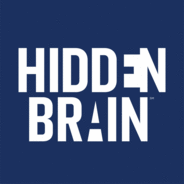In 2009, an old man died in a California nursing home. His obituary included not just his given name, but a long list of the pseudonyms he'd been known to use. In this episode, which we originally released in 2019, we trace the life of Riley Shepard, a hillbilly musician, writer, small-time con man and, perhaps, a genius.

Wissenschaft & Technik
Hidden Brain Folgen
Why do I feel stuck? How can I become more creative? What can I do to improve my relationships? If you’ve ever asked yourself these questions, you’re not alone. On Hidden Brain, we help you understand your own mind — and the minds of the people around you. (We're routinely rated the #1 science podcast in the United States.) Hosted by veteran science journalist Shankar Vedantam.
Folgen von Hidden Brain
569 Folgen
-
Folge vom 03.03.2020The Tale of the Cowboy Philosopher
-
Folge vom 24.02.2020The Influence You HaveThink about the last time you asked someone for something. Maybe you were nervous or worried about what the person would think of you. Chances are that you didn't stop to think about the pressure you were exerting on that person. This week, we explore a phenomenon that psychologists refer to as "egocentric bias," and look at how this bias can lead us astray.
-
Folge vom 17.02.2020Liar, Liar, LiarEditor’s note: Since this episode first aired, researchers have raised concerns about a number of studies authored by Dan Ariely, including one cited in this episode. That study included data from an insurance company that purported to show that people are more truthful when they sign an ethics declaration at the beginning of a form than at the end. In an independent review, a group of researchers found evidence of data fabrication in that study. You can read more about their findings here, along with Dan Ariely’s response. The insurance company that provided the data, The Hartford, released a statement to NPR’s Planet Money in July 2023. In that statement, the company said that it had done a review of its records and that “there appear to be significant changes made to the size, shape and characteristics of our data after we provided it and without our knowledge or consent.” You can hear the full Planet Money story and read the full statement from The Hartford here. Additionally, a second study cited in this episode – in which Ariely reported reduced cheating among test-takers asked to recall the Ten Commandments before taking the test – has not stood up to replication by other researchers. You can read more about that here. We all lie. But what separates the average person from the infamous cheaters we see on the news? Dan Ariely says we like to think it's character — but in his research he's found it's more often opportunity. Dan Ariely is a professor at Duke University and the author of the book, The Honest Truth About Dishonesty: How We Lie to Everyone — Especially Ourselves. We spoke to him in March 2017.
-
Folge vom 10.02.2020Passion Isn't EnoughMany Americans feel an obligation to keep up with political news. But maybe we should be focusing our energies elsewhere. Political scientist Eitan Hersh says there's been a rise in "political hobbyism" in the United States. We treat politics like entertainment, following the latest updates like we follow our favorite sports teams. Instead, he says, we should think of politics as a way to acquire power and persuade our neighbors to back the issues we support.
